QUOTES FOR CLASSIC FINAL
1/96
There's no tags or description
Looks like no tags are added yet.
Name | Mastery | Learn | Test | Matching | Spaced | Call with Kai |
|---|
No analytics yet
Send a link to your students to track their progress
97 Terms
“I won’t insist, nor if you change your mind, would your assistance please me.
Do as you think fit. I will bury him, and doing so, will find a noble death.
Having dared a holy crime, I will lie with the one I loved, and be loved. I must
satisfy those below far longer than those here since I’ll lie there forever. But if
you think it’s right, keep dishonoring what the gods honor.”
Antigone to Ismene
Antigone.
In the play, Antigone expresses her determination to honor her brother by giving him a proper burial despite the law forbidding it. This illustrates her struggle between familial loyalty and societal rules.
“I do no dishonor, but it goes against my nature to act in violence against the
people.”
Ismene to Antigone.
Antigone
In Sophocles' "Antigone," Ismene reflects her reluctance to defy the laws of the state, highlighting the conflict between obedience to authority and moral duty. She embodies the struggle to balance personal beliefs with societal expectations.
“I did not hear Zeus proclaiming it. Justice, who dwells
with the gods below, did not determine such laws for
human beings. I believed your mortal proclamation had
no such strength that you could override the unwritten
and unchanging rules of the gods. Not just for now or
yesterday, these rules live always; no one knows when
they first appeared. I would not risk the punishment of
the gods for fear of the will of any man.”
Antigone to Creon
Antigone defends her moral beliefs against Creon's edict. She argues that divine laws hold greater authority than human laws, emphasizing the eternal nature of justice.
“I knew very well that I would die, of course, even if you
had not proclaimed it. If I die before my time, I call it
pure gain. Whoever lives among so many evils, as I do,
how can he not gain by dying? So for me to meet this
fate is no grief. If I had dared to leave my mother’s dead
son a corpse unburied, for that I would grieve. But not
for this. If to you I seem to have done a foolish thing,
perhaps I’m charged with folly by a fool.”
Antigone to Ismene
Antigone expresses her acceptance of death as she prioritizes her duty to her brother over her own life. She finds honor in ensuring he receives a proper burial, asserting that dying for her beliefs holds more value than living in a state of dishonor.
“So why delay? Nothing you say gives me pleasure. May it
never! And I please you just as little. Yet how could I
have won glory more glorious than covering my own
brother in a grave? Everyone here would agree, if fear
didn’t lock up their tongues. But kingship is fortunate in
many ways and it can do and say what it wishes.”
Antigone to Creon
Antigone challenges Creon's authority and expresses her belief that honoring her brother's memory is her highest achievement. She highlights the fear that silences others while asserting the power of her convictions against tyranny.
“I will kill her. Let her sing about her Zeus, god of kindred
blood. If I nurture disorder in my own family, how much
more so in others? Whoever is dutiful in his own
household, will also appear just in the city”
Creon to his council
Creon declares his intent to execute Antigone for her defiance, arguing that maintaining order in his family reflects his ability to govern effectively. He emphasizes that loyalty to the state and family is crucial for justice.
Antigone Characterization
• Noble/ pious cause
• Courage and conviction in a seemingly insurmountable challenge
• Sense of justice
• Tragic circumstances and eventual tragic fate
• Strong-willed and determined
• Defies authority for familial loyalty
• Represents moral integrity in conflict with law
• Symbol of resistance against oppression
“My dear heart, Ismene, more than blood-sister,
is there even one thing from the evils of Oedipus
that Zeus doesn’t inflict on the two of us still living?
There is no pain or disaster,
shame or dishonor that I have not seen
among these evils of yours and mine.
Now what is the new proclamation they say
the commander has just made to the whole city?
Did you hear anything? Or didn’t you notice
that evils from our enemies advance upon our kin?”
Antigone to Ismene
Antigone expresses her anguish over the suffering inflicted by their family's cursed legacy and questions Ismene about Creon's new decree, highlighting their shared pain and the looming threats they face.
“K: Wasn’t the one who died on the other side also blood kin?
A: Blood kin from one mother and the same father.
K: Then why offer tribute that dishonors Eteokles?
A: The lifeless corpse will not bear witness to this.
K: Yes, if you honor him and the irreverent just the same.
A: It was not some slave, but his brother who died.
K: Trying to sack this land, while the other defended it.
A: Even so, Hades desires these traditions.
K: But the good man shuns an equal portion with the bad.
A: Who knows if that is sacred below?
K: An enemy is never a friend, not even when dead.
A: My nature is not to join in hating, but in loving.”
Antigone’s justification to Kreon
Antigone argues that honoring both brothers is a moral obligation, regardless of their actions, emphasizing her belief in familial loyalty and the sacredness of burial rites, contending that hatred contradicts her nature.
“Justice is helping one’s friends and
harming one’s enemies” (Plato’s Republic 1.334b)
“The virtue of a man is to excel his
friends in doing good and his enemies
in doing harm” (Xenophon’s Memorabilia 2.6.35)
Traditional Greek Morality: A set of ethical principles emphasizing loyalty, honor, and the importance of familial bonds. It suggests that justice involves both benefitting allies and punishing foes, highlighting the moral responsibilities individuals have to their kin and community.
“And whoever thinks a friend more important
than his fatherland, I say he is nothing.
Let all-seeing Zeus be my witness:
I would not wait silently, watching ruin
rather than deliverance advance on the city.
I could never consider any man my friend
who is an enemy of the state, knowing that
this ship keeps us safe and only by sailing
it straight can we determine our friends.”
Kreon’s first speech to the people of Thebes in Antigone
Kreon emphasizes the importance of loyalty to the state over personal friendships, asserting that true allegiance lies in preserving the welfare of the city. He expresses that a man who prioritizes friendship above his nation is not deserving of respect.
“Keep talking and I’ll hate you, and you’ll justly
lie beside your dead brother as an enemy.
But let me, and my ill-conceived plan,
suffer this dreadful fate – Nothing I will suffer
could be so terrible as to keep me from a noble death.”
Antigone to Ismene in Antigone
Antigone defines morality in terms of familial piety and divine laws
BUT, she also treats her ONLY remaining sibling, Ismene, calling her an enemy
She prioritizes her duty to honor her brother's burial over her sister's safety, illustrating the conflict between personal bonds and moral obligations.
“No! Not in front of me, never think that!
She will not be killed beside me
and you will never set eyes on my face.
Rave on, live with whatever kin are still willing.”
Haemon to Kreon in Antigone
Haemon expresses his fierce opposition to Kreon's decree regarding Antigone's punishment. He prioritizes his love for Antigone above his loyalty to his father, Kreon, illustrating the clash between familial loyalty and the authority of the state.
“Now I’m no man and she’s the man,
if this unchecked power lies with her.
Whether she is my sister’s daughter or closer
blood than my family at our shrine to Zeus,
she – and her sister – shall not escape
a most terrible fate…”
Kreon’s speech to the people of Thebes in Antigone
In this declaration, Kreon asserts that his authority as ruler is paramount, and he will not allow the laws of the state to be undermined by familial ties, emphasizing his determination to punish those who defy his orders.
Gender roles are challenged as Kreon considers Antigone's actions as a threat to his rule, suggesting that her defiance undermines traditional power dynamics in society.
“Go below now and love the dead, if you must love.
While I live, no woman shall rule me.”
Kreon to Antigone
Kreon expresses his refusal to be dominated by a woman, reinforcing his commitment to male authority and traditional gender roles in a patriarchal society. This highlights the struggle for power and control within familial and societal structures.
“Escort them inside, servants. From now on,
they must be women and not freely roam.”
&
“Thus one must defend order,
and in no way be less than a woman.
Better felled by a man, if need be,
than called weaker than women.”
Kreon to the guards and citizens of Thebes in Antigone
In this statement, Kreon reinforces the idea that women must be confined and restricted, upholding traditional gender norms while asserting his authority. He emphasizes that order must be maintained, highlighting his disdain for any challenge to male dominance.
“K: He, it seems, allies with the woman.
H: Only if you are the woman – my concern is for you.
K: By accusing your father, you scoundrel?
H: Yes, because I see you erring against justice.
K: I err in respecting my own authority?
H: You don’t respect it, trampling on the gods’ honors.
K: Foul creature, inferior to a woman. (740–746)”
This exchange between Kreon and Haemon in Antigone
Tension between personal loyalty and duty to the state. Kreon insists on his authority while Haemon argues for justice and divine law, challenging Kreon's views on gender and leadership. The dialogue underscores the conflict between masculine power and moral righteousness.
“We need to recognize that we are women,
not meant to fight against men.
Since we are ruled by those more powerful,
we must obey now and in yet more painful ways.
I beg those below the earth
for pardon since I’m forced in this matter.
I will obey the authorities.
To do something so extreme makes no sense.”
Ismene to Antigone
Ismene is a woman, but unlike Antigone, she respects civic morality in addition to familial
She highlights the inherent limitations placed on women in a patriarchal society, emphasizing the pain of obedience and the struggle between personal desires and societal expectations.
“But I can hear things under darkness,
how the city weeps for this girl,
of all women most undeserving to perish
most evilly for the most noble deeds.
Who, her brother fallen in bloody battle,
didn’t leave him unburied to be destroyed
by flesh-eating dogs or some birds of prey.
Is she not worthy to win golden honor?
Such the dark rumor silently spreads.”
Haemon to Kreon in Antigone
Haemon is a man, but unlike Kreon, recognizes both the familial and the civic
He empathizes with Antigone's plight, advocating for justice over blind adherence to authority. In his speech, he highlights the value of moral courage and compassion, challenging Kreon's rigid views.
“No, even if a man is wise, there’s no shame
in learning many things and not being too rigid.
By the winter-swollen streams you see
which trees bend and save even their twigs,
but the stiff are destroyed root and branch.
And when a man in power keeps taut
his ship’s rigging and yields not a bit,
he overturns the ship and navigates upside down.
Relax your anger and let yourself change.”
Haemon to Kreon
In this passage, Haemon advises Kreon on the importance of adaptability and the value of wisdom. He uses the metaphor of trees bending in the wind to illustrate that those who are too rigid or inflexible in their beliefs are ultimately doomed to failure, emphasizing the need for humility and the willingness to learn.
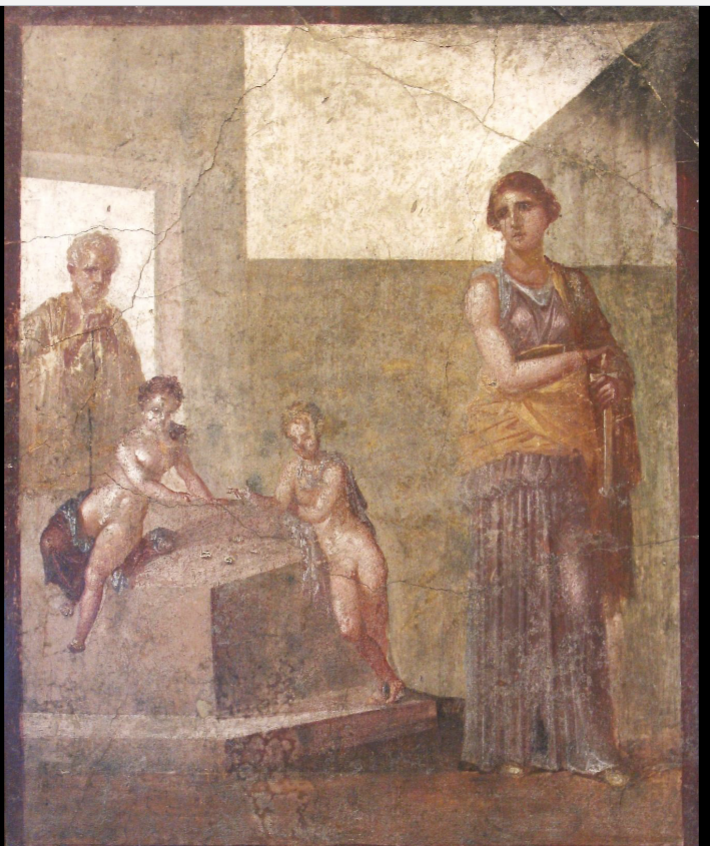
What does this image depict? Which work is it in?
Depiction of Medea and her children from the play "Medea" by Euripides.
This image depicts Medea, a vengeful woman, in a moment of turmoil after the betrayal by her husband Jason. The play "Medea" by Euripides explores themes of love, betrayal, and the extreme measures a scorned woman will take.
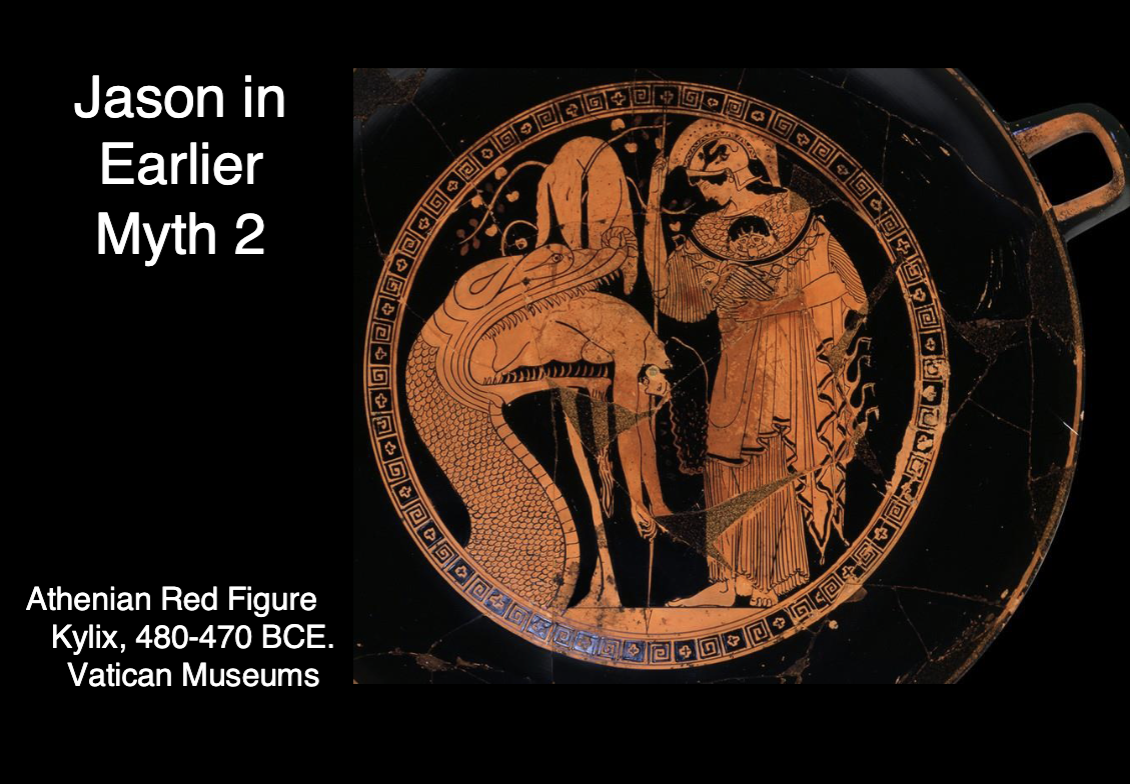
What does this image represent? What does it depict?
Red Figure (480-470 BCE)
The image depicts the a Dragon that guards the Golden Fleecee consuming the heroes who seek it in the story of "Jason and the Argonauts." This myth explores themes of bravery, greed, and the challenges faced in the pursuit of glory.
Jason being regurgitated by the snake who keeps the Golden Fleece (center, hanging on the tree); Athena stands to the right. Red-figured cup by Douris, c. 480-470 BC. From Cerveteri (Etruria)
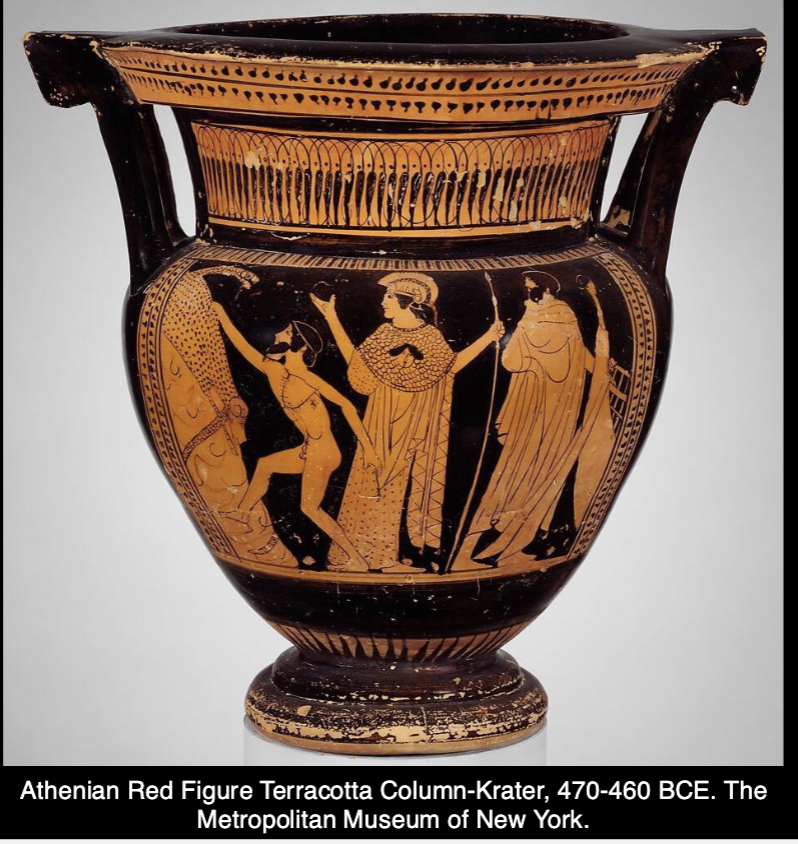
What figure is this? What does this image depict? In what work?
Red Figure (470-460 BCE) Archaic
Euripides, Medea: With the help of the gods and the sorceress Medea, Jason was able to take the fleece from a grove protected by a dragon. Here, with Athena beside him, he reaches for the fleece. A companion prepares to board the ship.
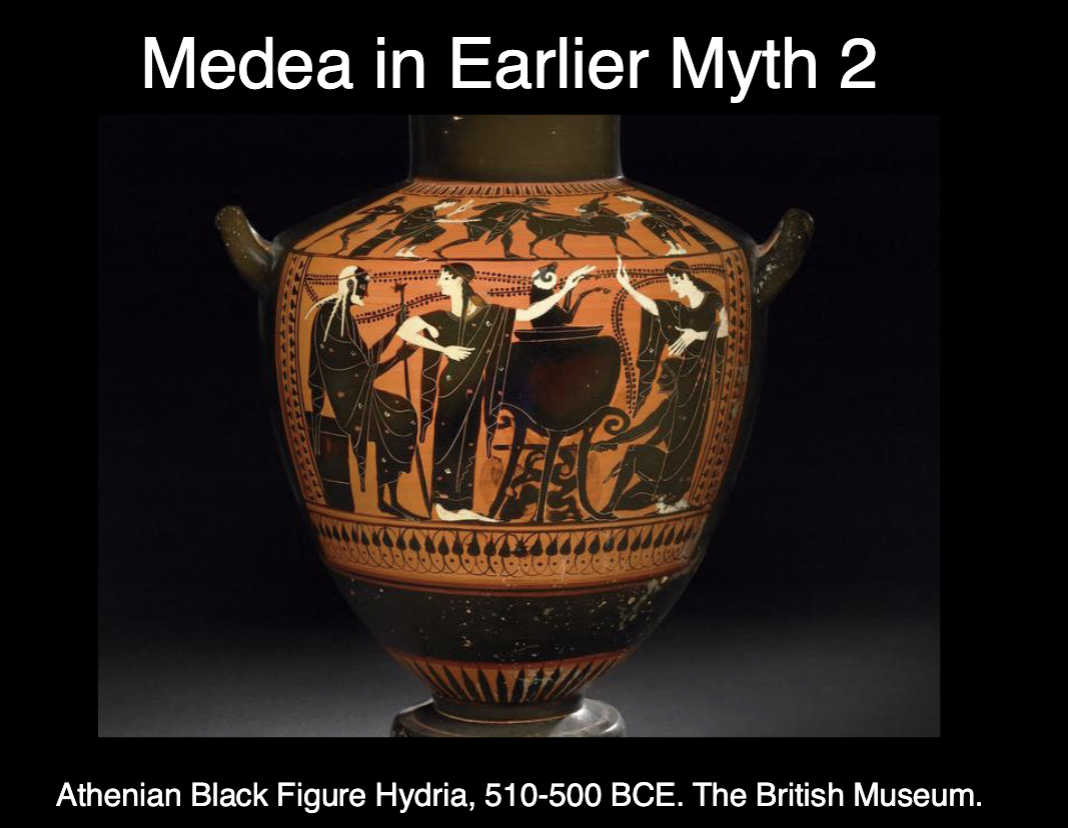
What figure is this? What does this image depict? In what work?
Euripides, Medea. This image depicts Medea engaged in her sorcery, showcasing her ability to rejuvenate Aeson. The Black Figure Hydria, dating from 510-500 BCE, captures the moment of her using magic to restore youth, reflecting her profound magical skills in the play "Medea" by Euripides.
Black Figure Hydria showing Medea boiling the ram (510-500 BCE)
Therefore, the scene likely shows Medea demonstrating her magical powers by rejuvenating Aeson in the cauldron.
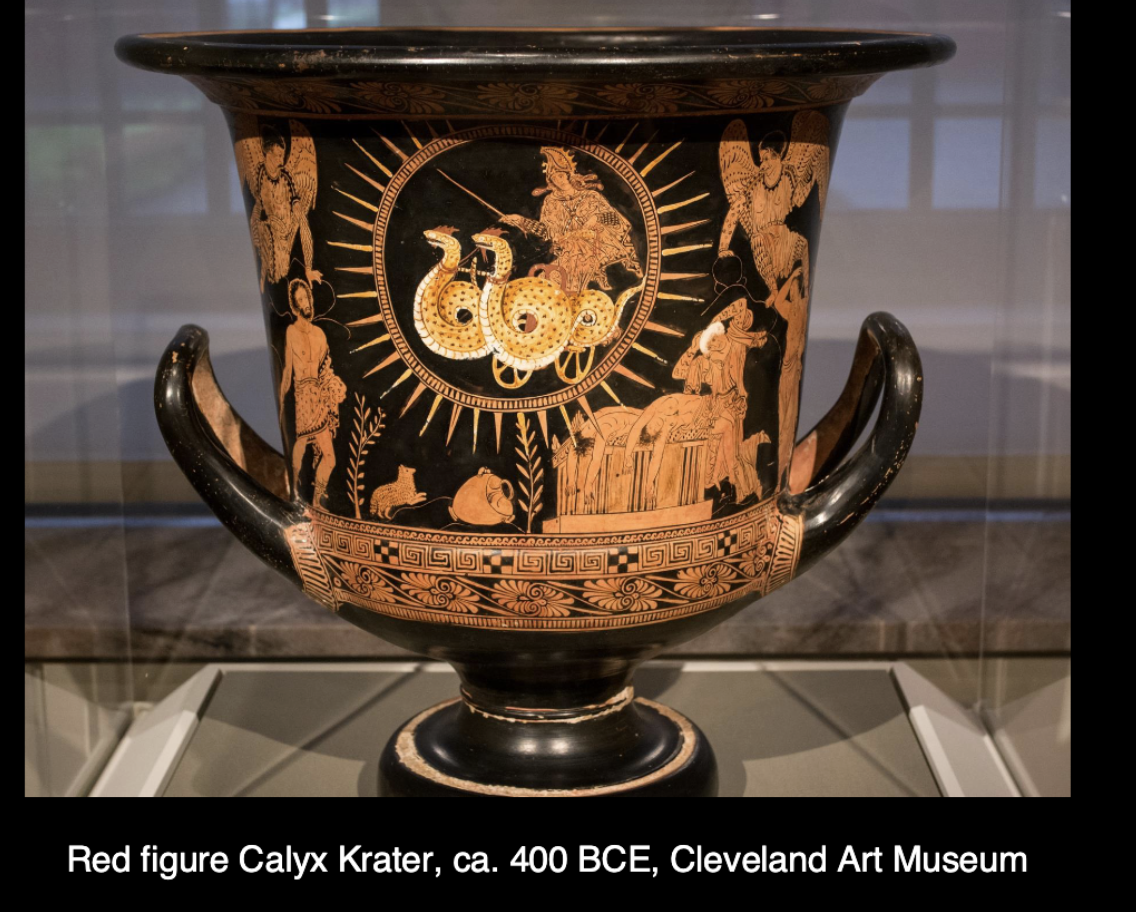
What figure is this? What does this image depict? In what work?
Euripides, Medea: Red Figure
This red-figure calyx krater depicts the dramatic and supernatural departure of Medea in her dragon-drawn chariot after her vengeful killings.
Jason in Medea:
• Distinctly non-heroic: his earlier successes are
due entirely to Medea (475-488).
• Self-serving: despite all that Medea has done
for him, once he has an opportunity to get
ahead he abandons her (488-495).
• Glib: on top of everything else, he has the gall
to tell her that everything he’s done was for her
own good (522-568).
Medea in Euripides’ Medea
• A victim: a woman who
gave up everything for
Jason only to be
abandoned by him (16-23)
• But at the same time
highly dangerous: clever
and capable, determined,
and very vengeful (36-45).
“This thing has fallen on me like a bolt from nowhere,
destroying my soul. I’m ruined. The joy of living
is gone for me. I want to die, my friends.
The one who was everything to me (I know it)
has turned out the worst of men, my husband.”
Medea’s first speech to the Chorus (married women of Corinth)
Medea expresses her profound despair and betrayal after Jason's abandonment.
– The difficult situation of women in general
in Greek society: lines 230-51
– Medea’s situation even more difficult than
that of women in general, since she also
has no birth family in Corinth: lines 252-58
“I’ll do as you ask. Justly, Medea, you’ll pay
your husband back. No wonder you grieve for
what’s happened.”
(chorus’ reply to Medea, lines 267-68)
The Chorus acknowledges Medea's pain and encourages her thoughts of revenge, empathizing with her grief over Jason's betrayal.
“I’m warning you,
if the rays of the coming dawn shall look upon you
and the children within the boundaries of this land,
you’ll die.”
Creon to Medea
Creon’s reply to Medea begging for more
time to prepare herself and her children
for exile (351-354)
“Do you suppose I’d ever have flattered that man
unless devising something for my profit? ...
...he allowed me to remain this day,
in which I’ll make three people corpses”
Medea’s second speech to the Chorus
Medea reveals why she begged him to remain an
extra day: she plans to take revenge on Jason and intends to kill Jason, his new bride, and her own children, showcasing her desperation and resolve.
“No, by the mistress whom I most revere
of all, and chose to help me in my work,
Hecate, who lives in the recesses of my hearth,
they’ll not make my heart hurt and get off free! (395-98)
......
You see what they’re doing to you? You mustn’t be
laughed at by this Sisyphian marriage of Jason,
since your father was noble, and his father, the Sun.
You know how.”
Medea addressing herself
Medea is expressing her motivations
“And what is more, we’re women,
quite unable to manage good, but none more skilled
when it comes to crafting every kind of evil. (408-10)”
Medea to the Chorus: further appeals to the negative stereotypes of women
Medea asserts that while women may struggle with virtue, they are adept at manipulation and executing revenge, revealing her understanding of gender and power dynamics.
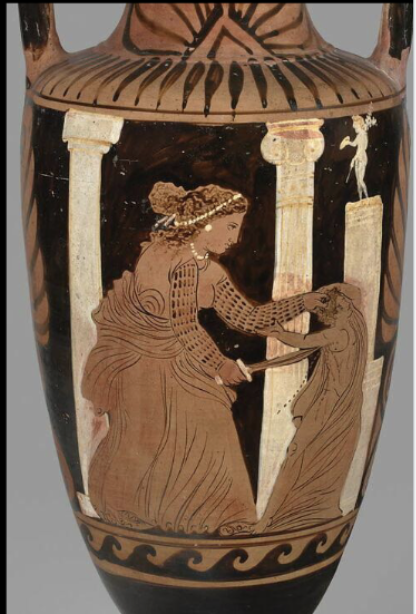
What does this image depict? What work is this from? What figure is it?
Red figure vase paitning
Euripides’ Medea
Depicts Medea killing one of her sons
Medea as a Moral Agent
Helping friends and harming enemies. Medea's actions reflect her choices to help those she values and inflict pain on her foes, embodying a complex moral landscape where loyalty and revenge intersect.
Concern with public image: Medea will not allow anyone to think of her as helpless, but will prove that she is capable of inflicting harm on her enemies or help her friends
“..You often clasped my right hand.
How fruitlessly I appealed to you,
you evil man! My hopes all misfired.”
Medea’s speech to Jason
She expresses her deep sense of betrayal and frustration with Jason, highlighting the emotional turmoil caused by his abandonment and their fractured relationship.
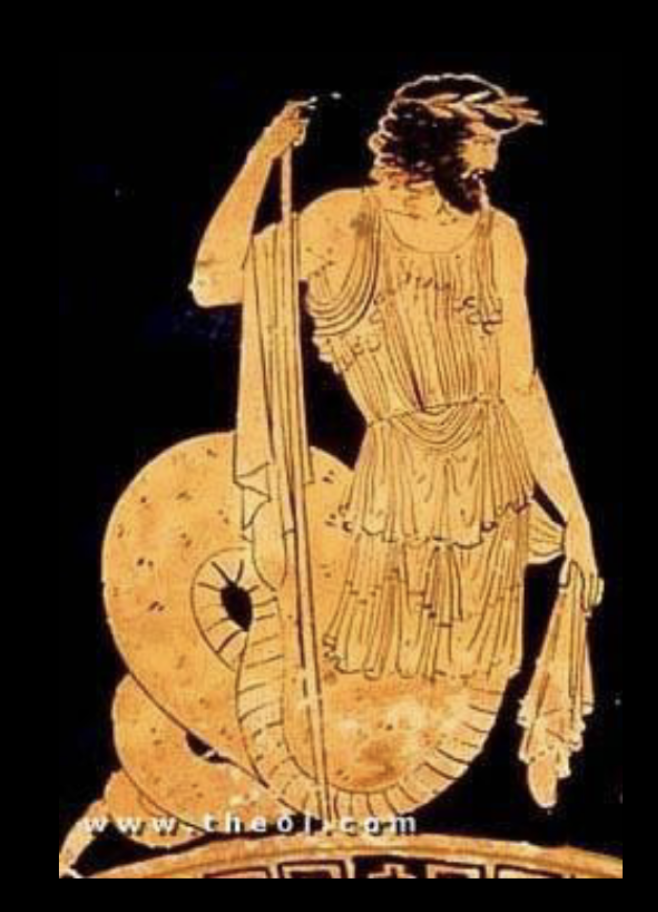
Who is this? What kind of figure is this?
Red figure
First King of Athens
half man and half serpent
Father of Pandrosos and her sisters
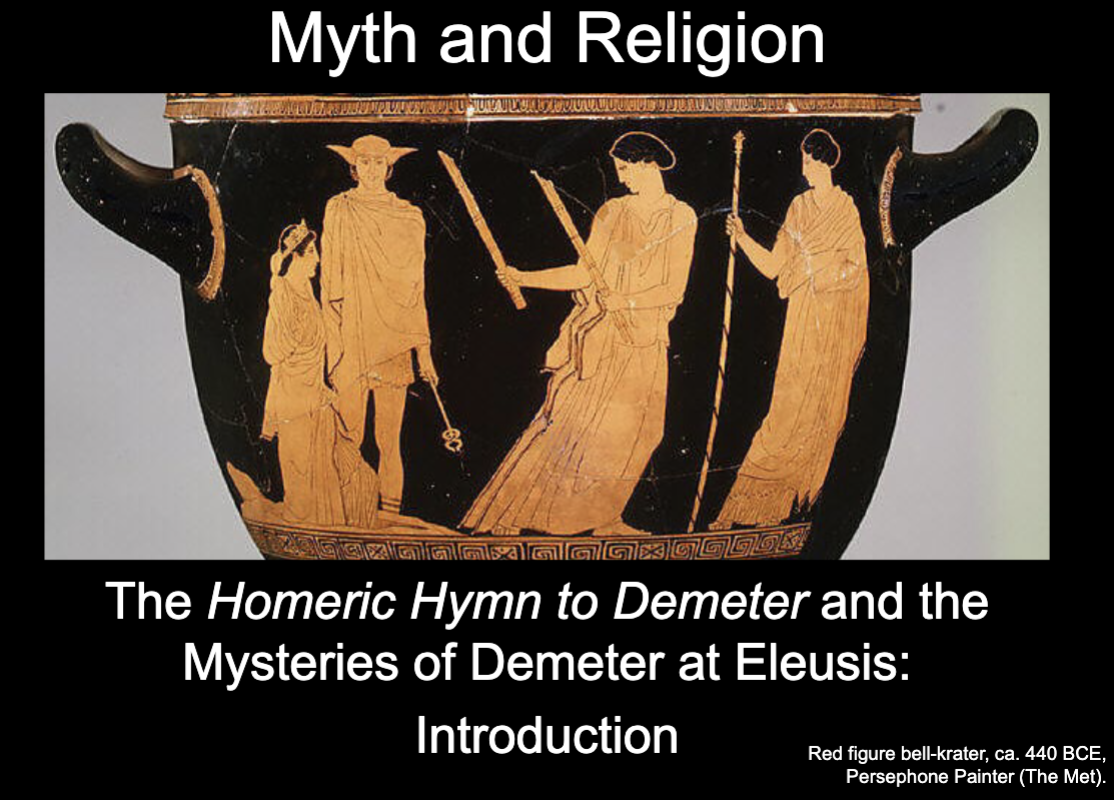
What kind of figure is this? What works? What does it depict?
Red figure (440 BCE)
Hymn to Demeter
Demeter and the return of Persephone from the abduction by Hades
What is the significance of changing how Persephone only returns for 2/3 of the year in the Homeric Hymn to Demeter?
– An aetiology of the seasons: Persephone’s time in
the underworld is connected with the dormant season
and her return to Olympus with the spring (395-403).
drōmena
“things done”
legomena
“things said”
deiknumena
“things shown”
“Demeter and
Kore have come to be the subject of a mystic
drama, and Eleusis celebrates with torches the
abduction of the daughter and the sorrowful
wanderings of the mother”
Lactantius (early 4th c. CE): “In the mysteries of
Demeter all night long with torches kindled they
seek for Persephone and when she is found, the
whole ritual closes with thanksgiving and the
tossing of torches” (Epitome of Divine Institutes
23)
“Things done” Example in Demeter
The Initiation into Demeter’s cult
“I have fasted; I have drunk
the kykeōn; I have taken from the chest, having
done the work; I have placed in the basket, and
from the basket into the chest” (Exhortation to the
Greeks 2.21). -
“Things said” example: According to Clement of Alexandria, this was the
solemn profession made by new initiates at the
end of the ceremony
kykeōn
“something stirred up,” from
the verb kykān, “to stir.”
The Initiation
often referred to as a DRINK that the Demeter Initiates drink to break their fast
Hippolytus of Rome (mid 3rd c. CE): “The
Athenians, when initiating people at the Eleusinia,
show to the initiates that great and marvelous
mystery of perfect revelation, in solemn silence,
cut wheat” (Refutation of Heresies 5.38)
Example of “Things shown”
““Nine days across
the earth majestic
Deo roamed,
holding in her hands
two flaming torches,
so anguished that
she would not eat
ambrosia, drink
delicious nectar, or
wash her body”
(47-50)”
The Journey to Eleusis
Initiates walked to Eleusis and faste before the initiation
Torches are commonly associated with the Mysteries (Clement, Lactantius), especially holding one in each hand
What is this? What figure? Who is it for?
The “Ninnion tablet”
Red Figure
dedicated to Demeter and Persephone by Ninnion
Artistic representation of the Mysteries at Eleusis
““Grief in her heart,
she sat down by the
road, by the
Maiden’s Well,
where citizens drew
water” (98-9)
...
“Build me a great
temple...above
Callichoros” (272)”
Arrival at Eleusis
The Kallichoron Well, adjacent to the entrance to the sanctuary, was considered to be the very one that Demeter sat by in her grief
““Then Metaneira filled a
cup with sweet wine to
give her. She replied that
she must not swallow the
deep red drink. She told
her to mix water with
barley and soft
pennyroyal for drinking.
The lady gave her this, as
she was ordered, and the
majestic Deo drank, in
ritual” (206-11)”
The Kykeon
a drink for Initiates to break their fast
““Let all the people build
me a great temple
shading an altar, by the
city’s steep wall, above
Callichoros, on the
jutting hilltop. There I will
teach my mysteries;
from now on the holy
ritual will soothe my
spirit” (270-4)”
The Telesterion, where the mysteries took place, was located “by the city’s steep wall, above Callichoros [the Kallichoron Well] on the jutting hilltop
“She went then to the
kings, keepers of
custom, Triptolemus,
Diocles driver of horses,
strong Eumolpus,
Celeus the commander,
and taught all these her
proper rites and
mysteries – sacred,
inviolable, not to be
questioned or told of”
(473-479)”
The Mysteries were performed every year, and initiates never revealed them to non-initiates
In historical times, the chief priesthood at Eleusis belonged by inheritance to the family of the Eumolpidai (“the sons of Eumolpus”)
Dionysus
God of Wine
Holds a Thyrsus (stagg with a pinecone on top)
Homeric Hymn to Dionysus by____?
Dionysus a God who is free of restraints and wine.
Bacchae, Euripides
someone who can cross the boundary between animal and human
“They’ve set up their mixing bowls brimming with wine
amidst their cult gatherings and each lady slinks off in a
different direction
to some secluded wilderness to service the lusts of men. (221-
23)
For whenever the liquid joy
of the grape comes into women’s festivals, then, I assure you,
there’s nothing wholesome in their rites. (260-62)”
Pentheusthe king of Thebes who opposed the worship of Dionysus and was ultimately punished for his disrespect towards the god.
Bacchae by Euripides
“They were all sound asleep, relaxed in their bodies,
some leaning their backs on fir-tree foliage,
others resting their heads on oak leaves,
scattered on the ground haphazardly but modestly
and not, as you claim, drunk with wine and flute
music,
and hunting down Aphrodite’s delights on solo
missions in the forest. (684-88)”
Messenger #1 in the Bacchae by Euripides
This passage reveals the peaceful, unintended slumber of worshippers, contrasting with assumptions of drunkenness and promiscuity, emphasizing the misunderstood nature of their gatherings.
“- ‘O blessed is he who / . . . joins his soul to
the cult group, / dancing on the mountains’
(72-76)
– ‘Immediately the whole land will dance /
whenever the roaring Bromios leads the
bands of revelers to the mountain, to the
mountain’ (114-16; compare 164-65)
– ‘Sweet is the pleasure the god brings us in
the mountains’ (135)”
Choral Entrance Song of the Bacchae by Euripides (64-169) to introduce Dionysus and his divine influence among his followers. It highlights the joyous and communal celebration central to his worship.
‘I’ve shackled with chains all those
[maenads] I captured / and thrown them into the
public jails where my soldiers keep guard.’ (226-227)”
Pentheus in the Bacchae by Euripides
This quote reflects Pentheus' harsh treatment of the , showcasing his attempt to suppress their worship of Dionysus. It illustrates his conflict with the divine and the consequences of opposing the god's influence.
Maenads of the Bacchae
female followers of Dionysus known for their frenzied worship and ecstatic celebrations.
‘Now as for the Theban Bacchae whom you
shut up / and seized and bound in chains at the
public jail, / those women are gone, let loose and
skipping off, / off to the mountain meadows, calling
out to Bromios as their god. / The chains, of their
own accord, came loose from the women’s feet / and
the keys unlocked the jailhouse doors without a
human hand.’ (444-48)
Soldier in the Bacchae by Euripides
This quote illustrates the miraculous release of the maenads from captivity, emphasizing the power of Dionysus and the futility of Pentheus' efforts to control his divine influence. It highlights the theme of divine freedom versus human restraint within the play.
Soldier: ‘Pentheus, we stand before you having
captured this prey / after which you sent us; our
mission has been accomplished. We found this wild
beast tame. He didn’t try to escape / but gave his
hands to us willingly.’ ( 434-37)
• Pentheus: ‘Release this man’s hands. Now that he’s
in my net / he won’t be swift enough to escape me’
(451-52).
“Everything lies shattered / so that now he sees the
most bitter consequences of trying to chain me’ (634-
35).”
Dialogue between Pentheus and the soldier in the Bacchae by Euripides
The dialogue proves Dionysus as the god who breaks barriers and bursts bonds, who brings freedom from restraint
mountains = absence of civilization = no polis/laws
wine and intoxication
Messenger #1: the women excel at warfare
(751-64); ‘women routed men’! (764)
Agave: the women excel at hunting (1168-
1258); ‘it was I who left behind the spindles
at the loom / to come to greater tasks, the
hunting of wild beasts with my own hands!’
(1236-37)
Genders reversal
Women act like men
leave homes & abandon their responsibilities to enter the mountains
Initial scene between Pentheus and the
Stranger (453-518): "Pentheus is the macho
king, and mocks the Stranger for being
effeminate (453-59; cf. 233-40).
Yet Pentheus ends up dressed as a
woman (despite his initial refusal: 822-38),
with the Stranger totally in control (912-76)
What’s the importance of Pentheus, who is the macho king, mocking the Stranger (Dionysus) dressing up as a woman in the end?
The initial scene underscores themes of masculinity and identity as Pentheus, who embodies traditional masculine power, belittles the Stranger's perceived weakness. Ironically, his eventual submission to dressing as a woman symbolizes his loss of control and reinforces the fluidity of gender roles, showcasing the triumph of Dionysus and the idea that true power lies beyond rigid societal norms: MEN ACTS LIKE WOMEN IN THE BACCHAE BY EURIPIDES
THE NATURE OF EURIPIDES’ BACCHAE
DIONYSUS = GOD WHO BREAKS BARRIERS + GOD OF WINE + GOD OF NO RESTRAINTS + GOD WHO REVERSES CATEGORIES (MEN → WOMEN & VICE VERSA)
CIVILIZATION = RESTRAINT; DIONYSUS = NO RESTRAINT
WHEN PEOPLE
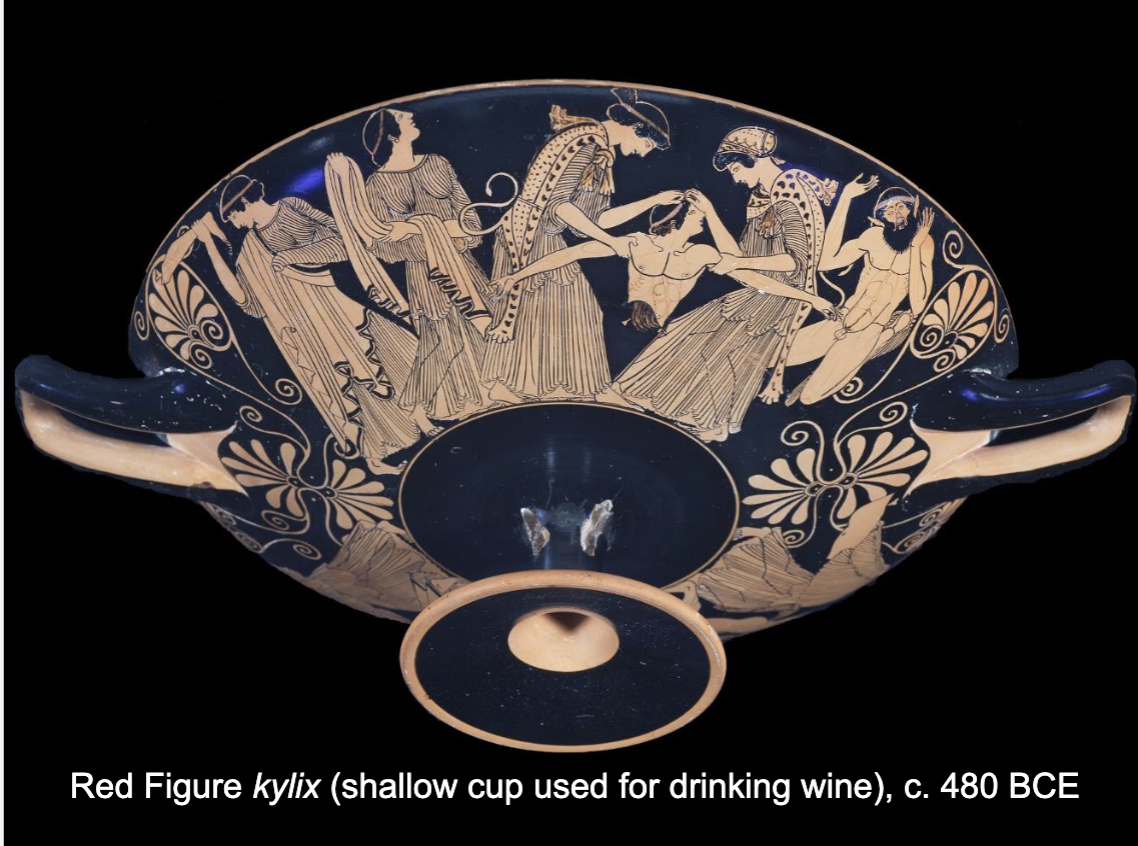
What figure is this? What work does this depict? What is the context?
Red figure
Bacchae by Euripides
Depiction of Pentheus’s sparagmos (tearing/rending” by the Maenads
Cupid =?
Venus =?
Ceres =?
Juno =?
Jupiter =?
Mercury =?
Pluto =?
Eros
Aphrodite
Demter
Hera
Zeus
Hermes
Hades
syncretism
“the combination of different forms of belief or practice”
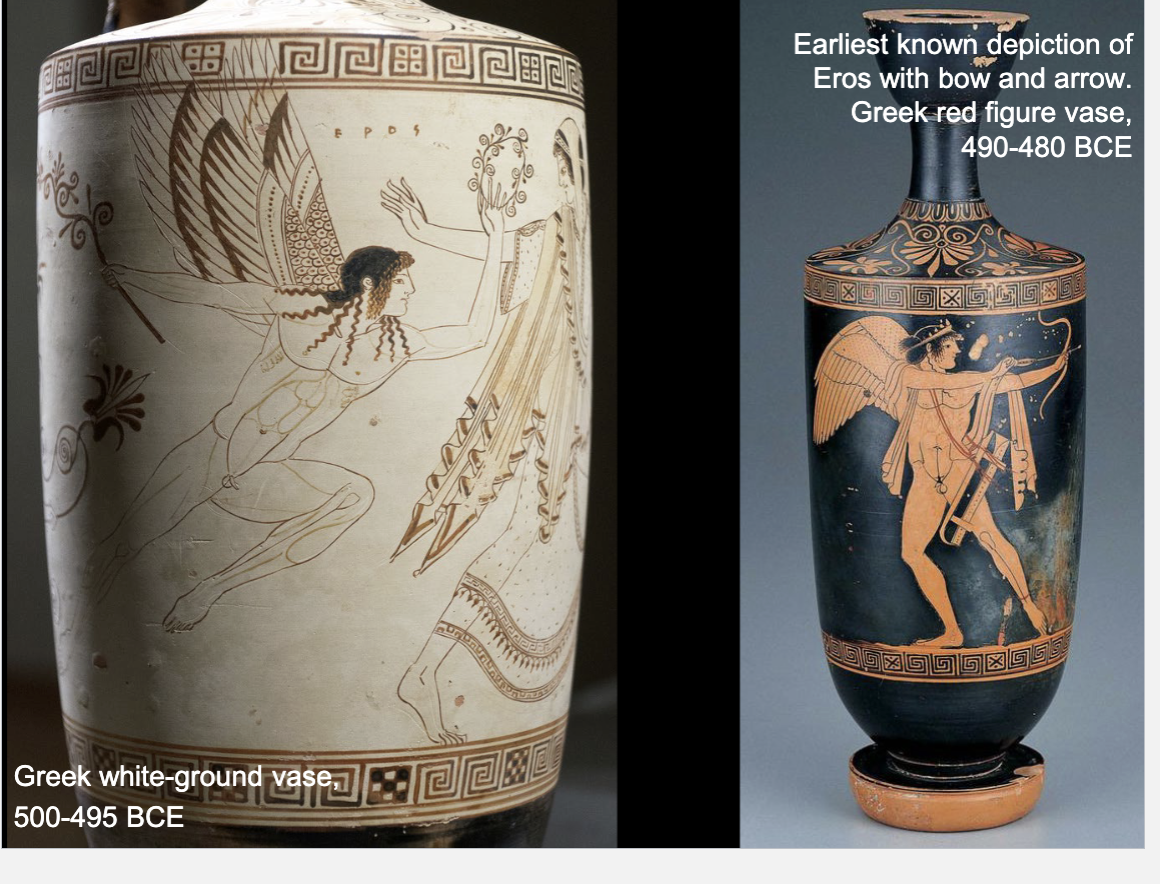
What does this depict?
Red figure depiction of Eros (Cupid)
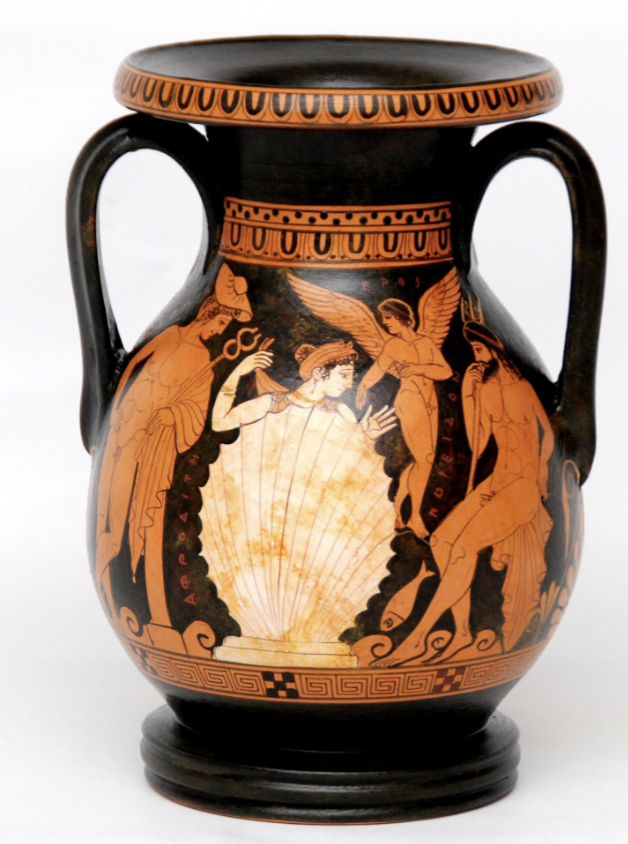
What does this depict?
red figure of the birth of Aphrodite
Events leading up to the Trojan war
– Tyndareus and the wooing of Helen
– Paris and the abduction of Helen
– Agamemnon and the sacrifice of Iphigenia
• Some events during the Trojan war:
– The wrath of Achilles (Iliad)
– The Trojan Horse and the sack of Troy (Aeneid)
• Some events in the aftermath of the war:
– nostoi (“homecomings”)
• Agamemnon (Oresteia)
• Odysseus (Odyssey)
“Writing back’s no good. Come in person!
Troy, the town that Greek girls hate, has definitely fallen.
Priam and all Troy were hardly worth the price I’ve paid.
Oh, if only the adulterer Paris had been drowned by a
raging sea when he was sailing to Sparta!
Then I wouldn’t have slept alone in a cold bed or be
complaining, all on my own, that the days pass slowly,
and I wouldn’t be wearing out my widowed hands weaving
in an attempt to beguile the long nights.
Heroides 1.1–10”
From Penelope to Ulysses (Odysseus)
Ovid’s Odyssey
This poem expresses Penelope's feelings of loneliness and longing for Ulysses, reflecting her despair over his absence and the impact of the Trojan War on their lives.
“If he lives, Telemachus will grow stronger, but at this
point he needs you to help and protect him.
I don’t have the strength to drive the enemies from our home.
Come quickly, and be a great refuge for your family!
You have a son (may he survive!), who at his tender
age should have been trained in his father’s ways.
Think of Laertes: he is putting off his dying day
so you can be here to close his eyes.
I was a girl when you left. Even if you come at once,
believe me, you’ll see that I’ve become an old woman.
Heroides 1.107–116”
Penelope to Odysseus
Ovid’s Odyssey
This is a heartfelt appeal from Penelope to her husband Odysseus, highlighting her loneliness and responsibility as a mother. She urges him to return, reflecting on their son Telemachus growing up without his father's guidance.
This poem is a plea from Penelope, expressing her desire for Odysseus to return home and protect their son Telemachus while lamenting the passage of time and her aging.
“Any foreigner who lands on our shore only goes away
after being cross-examined by me about you
and being given a letter written by me to pass on
to you, if he sees you somewhere.
I sent to Pylos, the land of aged Nestor;
no clear news of you came back from Pylos.
I sent to Sparta; Sparta doesn’t know the truth either.
Where are you living or tarrying, apart from me?
Heroides 1.59–66”
Penelope to Odysseus
Ovid’s Odyssey
This line reveals Penelope's deep yearning for news of her husband Odysseus, underscoring her sense of isolation and the burdens she faces during his absence. Her persistence in seeking information reflects her hope and despair.
This quote is from Penelope, expressing her frustration and anxiety as she seeks news of Odysseus. Her detailed inquiries about his whereabouts highlight her desperation and the emotional toll of his absence.
“Of all the women snatched so far has any been recovered
by combat?
Believe me, there’s nothing to fear in connection with
kidnap.
Thracians took princess Orithyia captive (for Boreas, they
said),
and yet war wasn’t made on the country of Thrace.
Jason carried off Medea from Colchis on the first ship,
but his land of Thessaly wasn’t harmed by a Colchian
army.
Theseus, who abducted you, also abducted Ariadne,
but her father Minos didn’t call his men to arms. 16.343–350”
Paris to Helen of Troy
These lines are spoken by Paris to Helen in Ovid's Heroides, specifically in Heroides 16, Paris to Helen.
In this letter, Paris is trying to persuade Helen to leave her husband Menelaus and come away with him to Troy. He is using examples from mythology of other famous abductions that did not result in widespread conflict or devastating wars (at least initially, in the way the Trojan War did). He's attempting to alleviate Helen's potential fears about the consequences of eloping with him
“The love of strangers is unreliable; it strays, like them,
and, when you hope it’s completely dependable, it’s
gone.
Hypsipyle is witness to that, and so is Ariadne, both
cheated when marriage to the man didn’t materialize.
You are unfaithful too. They say you deserted your
Oenone after loving her for many years.”
Helen to Paris
Ovid’s Heroides
In this passage, Helen expresses her distrust of love, drawing on examples of women who were betrayed in their relationships. She reflects on the ephemeral nature of affection and questions Paris's fidelity, emphasizing her own doubts and insecurities in their romantic bond.
“Lying Jason promised Medea everything,
but drove her from his home none the less.
She didn’t have her parents Aeetes and Idyia or her sister
Chalciope to go back to when she was spurned.
I don’t fear anything like that, but Medea didn’t either.
Anticipation often misleads us into high hopes”
Helen to Paris
In this excerpt, Helen reflects on how promises of love can lead to betrayal, using Medea's experience as a cautionary tale. Her words convey skepticism about romantic assurances and the vulnerability that accompanies love, revealing her fears of abandonment.
“It’s true, your letter is rich in promises of gifts so splendid
that goddesses themselves could be won over by them;
but if I was now willing to overstep the bounds of decency,
you yourself would be a better reason for committing
adultery.
Either I’ll maintain my spotless reputation forever,
or I’ll go for you rather than your presents”
Helen to Paris
In this passage, Helen acknowledges the allure of Paris's promises but affirms her commitment to virtue over temptation. She emphasizes the value of her reputation, suggesting that even enticing gifts cannot sway her moral integrity.
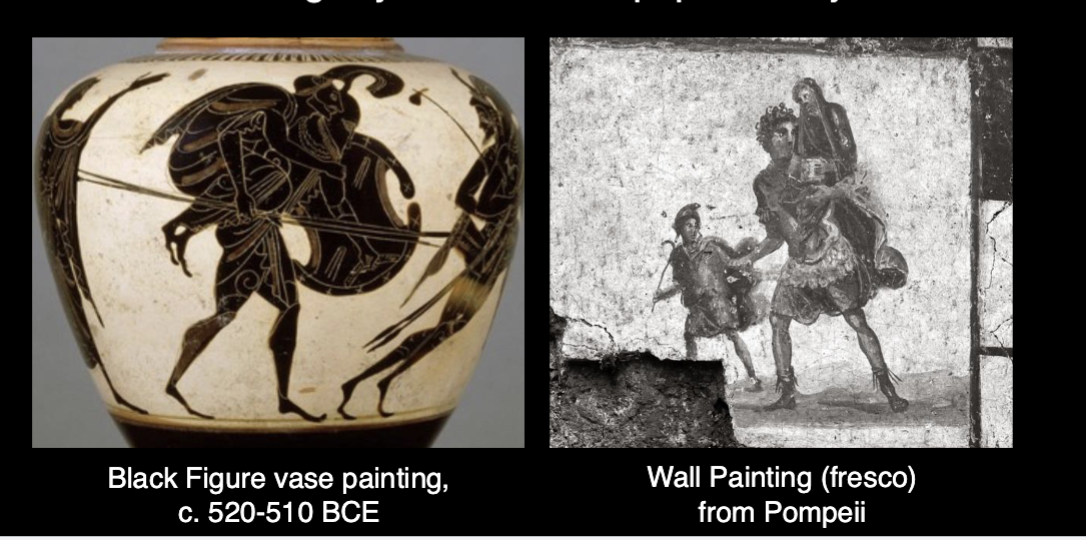
What does represent?
Anneas rescuing his father, Anchises, from the terrorizing of Troy by carrying him on his back while leading his osn Ascanius with him out of the crumbling/burning Troy.
The image represents the themes of duty, sacrifice, and the bonds of family in the face of adversity, showcasing Aeneas as a symbol of heroism and responsibility.
“What’s to be gained by giving way to grief
So madly, my sweet husband? Nothing here
Has come to pass except as heaven willed.
You may not take Creusa with you now;
It was not so ordained, nor does the lord
Of high Olympus give you leave. For you
Long exile waits, and long sea miles to plow”
Creusa to Aaneas
Virgirl’s Aeneid
In Virgil's Aeneid, after the fall of Troy, Aeneas tries to flee with his family, including his wife Creusa. However, Creusa is lost in the chaos and Aeneas returns to the burning city to search for her. It is then that her shade appears to him and speaks these words, telling him not to grieve excessively for her death, as it was the will of the gods. She informs him of his destined long exile and journey by sea, and that he will not take her with him because it is not fated.
“She dissolved into thin air, leaving me
in tears, wanting to say so much. Three times
I tried to throw my arms around her neck,
three times the ghost I tried to hold flowed through
my hands—like a light breeze or a fleeting dream.”
Anneas recounts his encounter with Creusa's ghost, expressing his anguish and longing. This passage highlights themes of loss and the ineffable nature of love, as he is unable to physically connect with her spirit.
Virgil’s Aeneid
“And I, my mind in turmoil, how I longed
to embrace my mother’s spirit, dead as she was!
Three times I rushed toward her, desperate to hold her,
three times she fluttered through my fingers, sifting away
like a shadow, dissolving like a dream, and each time
the grief cut to the heart, sharper, yes, and I,
I cried out to her, words winging into the darkness:
“Mother—why not wait for me? How I long to hold you!”
Aeneas to his mother, Venus (Aphrodite)
Aeneas is overwhelmed with grief and longing to embrace her, but as a shade, she is intangible and slips through his grasp like a shadow or a dream. His repeated attempts and his heartbroken cry highlight his deep love and sorrow for his deceased mother.
“Three times he tried
to wrap his arms around his father’s neck; three times
his hands passed through the insubstantial shade, as if
it were the merest breeze, a fleeting dream.”
Aeneas experiences profound grief as he attempts to embrace the ghost of his father, Anchises, who appears to him during a moment of despair. This passage symbolizes the pain of separation and the ephemeral nature of life and love.
Virgil’s Aeneid
“But Aeneas,
when he recognized his mother, called to her:
“Why trick your son so often with disguises?
You’re as cruel as the other gods. Why can’t I
ever hold your hand in mine, or speak frankly?”
Anneas to Venus
Venus often appears to her son in disguise, helping him or guiding him without revealing her true form. Aeneas, recognizing her despite her current disguise, expresses his frustration at her frequent use of deception and his longing for a more direct and intimate connection with her.
Aeneas lost_____ in the Aeneid
his wife, Creusa
his father, Anchises
his mother, Venus
pietas
an attitude of dutiful respect towards those
to whom one is bound by ties of religion,
consanguinity, etc.’
How did Augustus presented pietas? How about Aeneas?
– Augustus: presented
himself as motivated
by piety towards his
father and the
common good.
– Aeneas: characterized
by piety towards his
father, the gods, and
the common good.
Dido and Aeneas, Pompeii, ca. 10 BCE – 45 CE
““Aeneas admires Vulcan’s shield, his mother’s gift,
pleased by images he does not understand. He
hoists the fame and fate of his descendants.”
(8.729-731)”
This passage reflects Aeneas's awe at the craftsmanship and the significant historical imagery on the shield, symbolizing his destiny and the future glory of Rome.
“he site of Praeneste was originally inhabited by two brothers,
the Depidii, and their sister. While tending a fire, a spark flew
into her lap and impregnated her. She gave birth to a son,
whom she abandoned; he was soon discovered on a hearth,
and raised by the Depidii, who called him a son of Vulcan.
After spending his youth as a shepherd and a raider, he
gathered comrades and founded Praeneste. When the
neighboring peoples who had been invited to the foundation
festival doubted the story of his birth, he prayed to his father
Vulcan to show him a sign; flames shot forth, and died back at
his command.”
This myth describes the legendary foundation of Praeneste, highlighting the divine parentage of its founder, who, after being abandoned and raised by the Depidii, gained acceptance through a miraculous sign from Vulcan.
Umbro(Aeneid 7.750–760)
– leader of the Marsi (= Marruvii)
– a people of central Italy east of Rome
• associated with snake-charming
• worshipped a goddess named Angitia
• Fucinus = name of a lake in their territory
Camilla ((Aeneid 7.803–817)
‒ leader of the Volsci, a people who lived south of
Rome
‒ given pride of place at the end of the “Gathering
of the Clans”
• No prior tradition of
a female warrior in
Latin literature
• Nisus and Euryalus (9.176–502)
– an episode invented by Vergil
– based on a nighttime attack by Odysseus
and Diomedes in Iliad Book 10, but with
significant changes:
• Odysseus and Diomedes are seasoned heroes
who wreak havoc and escape without difficulty
• Although Nisus and Euryalus are soldiers,
Euryalus is very young
– they wreak havoc, but can’t escape and
ultimately lose their lives
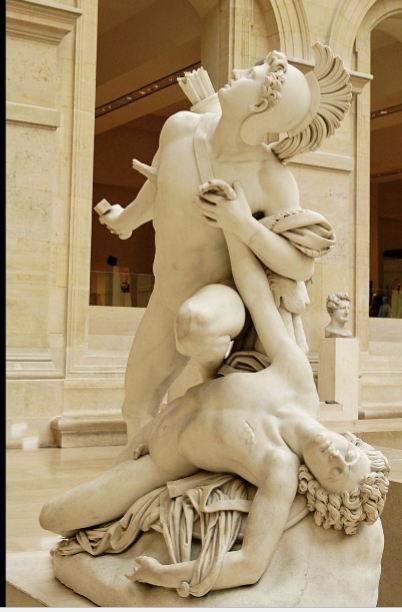
• Nisus and Euryalus
the two are introduced
earlier in epic (5.294–361)
– the death of Euryalus
(9.395–445)
– lament of Euryalus’
grief-stricken mother
(9.473–502) ends the
episode
Nisus kneeling over the body of Euryalus, 1827 marble
sculpture by Jean-Baptiste Roman (Louvre Museum)
“There are twin Gates of Sleep. One, they say, is made
of horn, and lets true visions pass through easily.
The other gleams with complex work in ivory,
but through it shades send lying visions to the light.
Anchises and the Sibyl brought Aeneas
to this gate and sent him through.”
The narrator is addressing the reader. Anchises and the Sibyl are guiding Aeneas. No direct dialogue within this passage.
Which work is it from? Virgil's Aeneid, Book VI.
Introduces ambiguity about the truth of the visions Aeneas witnessed in the Underworld (especially Anchises' prophecies about Rome). The Gate of Horn suggests truth, while the Gate of Ivory suggests potential falsehood or deception.
What are the paraelles between the deaths of close comrades in the Ilaid vs Aeneid?
• Iliad
– Achilles is attached to Patroclus
– Patroclus is killed by Hector
– Achilles kills Hector in revenge
AENEID
- Aneas is attached to Pallas
– Pallas is killed by Turnus
– Aeneas kills Turnus in revenge
Aneas is PIOUS how?>
Anneas cannot simply follow his own selfish needs and desires, either for death in a glorious battle or for the love and security with Dido. He must prioritize his destiny and the fate of his people, showing loyalty and responsibility to the gods and his people.